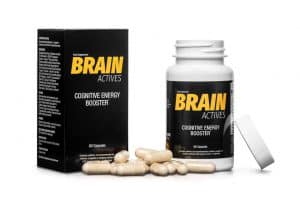Concentration is a specific ability of our mind to focus and maintain attention on a particular problem, object or phenomenon. It develops with age, but can also become difficult to achieve for older people or as a result of unfavorable circumstances and lifestyle. How to improve concentration? It turns out that it is by no means very complicated, it just requires some lifestyle changes and consistency in their fixation.
Table of contents
- 1 How to improve concentration and memory by exercising the mind?
- 2 Examples of exercises for concentration
- 3 Additional important factors to be taken into account
- 4 Oxygenation of the body, and thus the brain, is a prerequisite for mental performance
- 5 The role of physical activity, or how to improve concentration through sport
- 6 The importance of sleep and rest for mental performance
- 7 The influence of diet on mental condition, or how to improve memory and concentration by eating right?
- 8 What should we eat in the first place?
How to improve concentration and memory by exercising the mind?
In a way, the brain is the same organ as any other, in order to remain functional, it needs to be constantly active. There is a popular saying that an unused brain, like an unused muscle, simply atrophies.
Of course, this should not be taken literally, nevertheless, the constant exercise of memory and concentration, positively affects the work of the brain and brings direct benefit in the form of increasingly efficient mental functionality. This is especially important in the case of older people, because it prevents unfavorable changes in the functioning of all mental activities.
We have various techniques at our disposal – exercises, mind games, psychological therapies and even hypnosis. The most important thing is not to let our mind rot, to constantly mobilize it to work, to suggest problems to be solved, while taking care of proper supply of the brain with oxygen and nutrients, which will be discussed later. Thanks to the intensive mental effort our memory and concentration will work flawlessly even in unfavorable circumstances or in old age.
Examples of exercises for concentration

It is enough to devote even 15 minutes during a day to training your mind, and you will notice measurable results after a few days. There are many specific exercises, what’s more, we can invent them ourselves, and it will also be an additional exercise for the mind. The simplest and most obvious are such activities as reading texts requiring concentration, solving crosswords and mathematical tasks, solving puzzles, Scrabble, chess or some card games, for example bridge.
In addition, we can use simple techniques to focus attention, such as counting from 100 to 1, necessarily backwards, because this forces us to focus, or play association games. You can also look closely at an object, then hide it and try to describe it from memory. You can recall in detail events from the past, a book you once read, or a movie you watched a long time ago.
The work of the brain is also improved by seemingly unrelated manual activities. For example, the involvement of the non-dominant hand in everyday tasks, such as combing or turning the pages of a book, (left if we are right-handed and vice versa), significantly improves the work of the brain. Eye exercises work in a similar way – moving the eyes horizontally from the right to the left and vice versa, or rolling the eyes in figure eights, facilitates the cooperation of both cerebral hemispheres, as well as promotes the proper moistening of the eyeballs.
Additional important factors to be taken into account
It is also important to keep in mind the following rules
- avoid all distractions (TV, loud music, conversations) when performing a task;
- focus only on one goal and do not engage in several activities at the same time;
- memory is best trained by repeating newly acquired knowledge many times;
- If we have problems concentrating, we mobilise ourselves by finding positive motivation, for example: if I complete this task I will be promoted or rewarded in some way, when I have finished it I will be able to indulge myself, etc.
Oxygenation of the body, and thus the brain, is a prerequisite for mental performance
Theability to concentrate is a resultant of many different factors and circumstances. The improvement of all mental functions, including the ability to focus attention and efficient memory, is certainly favored by good oxygenation of the brain. Its hypoxia, on the other hand, may be a result of shallow, superficial breathing.
The process of breathing is involuntary and unconditional, therefore we often do not pay enough attention to it. Meanwhile, the same breath does not provide the brain with sufficient oxygen, as a result of which we feel tired and sleepy, and mental functions such as concentration, ability to associate quickly, memorizing, are significantly deteriorated.
It is worth remembering to do breathing exercises consisting in diaphragm breathing from time to time – we slowly take air in through our nose, activating the diaphragm and abdomen, and then slowly let it out through our mouth.
The oxygenation of the body is also positively influenced by the so-called aerobic exercises, i.e. oxygen exercises, therefore in the case of weakening of the mental functions it is recommended to take a break at work and do some exercises of this type. In general, we should take care to provide the body with as much fresh air as possible, walks and frequent ventilation of rooms are indispensable conditions of a hygienic lifestyle.
The role of physical activity, or how to improve concentration through sport

There is no doubt that any type of physical activity has a beneficial effect on our body, both in the purely physical and mental sphere. A human being is a psychophysical whole, therefore, as the old adage says – in a healthy body a healthy spirit. Physical fitness has a huge impact on the functioning of the brain, which has been proven by numerous studies. They have shown that even low-intensity but systematic sporting activity reduces the risk of Alzheimera, Parkinson’s and Huntington’s disease.
Aerobic exercise can be used at virtually any age and at any level of training, as can walking, swimming, yoga or aerobics. People who are more advanced in sports can use simple strength training, intervals, jogging or martial arts. What is important is not so much the type of sport, but regularity and regularity. You probably don’t need to be reminded that physical activity is not only good for your physical and mental health, but also for your slim figure. However, overtraining should be avoided, as it can upset the body’s biochemical balance and lead to an excessive production of free radicals.
The importance of sleep and rest for mental performance
If we want our brain to function flawlessly, we need to get enough sleep and learn to rest rationally. These truths are so obvious that they should not raise any doubts, however in today’s hectic and tense times many people seem to ignore them.
It turns out that shortening the amount of sleep even by two or three hours a day can have a negative impact on the basic mental abilities, and in the long run, cause serious memory disorders. Similarly destructive is the lack of rest, the inability to break away from current problems and full relaxation.
Unfavourable influence on the ability to concentrate and remember has, above all, a lack of sleep in the so-called NREM phase, preceding the REM phase. In the NREM phase, characterised by slow eye movements and the occurrence of delta waves of brain activity, cognitive functions are consolidated and strengthened. Too little sleep disturbs this process and results in concentration disorders during the day.
Therefore, let’s not begrudge ourselves sleep, and if we can afford it, let’s indulge in even a short nap during the day. It will certainly be good for our mental condition, and also for our physical health, because a lack of sleep also causes a decrease in the immunity of the body.
The influence of diet on mental condition, or how to improve memory and concentration by eating right?
A better mental and physical condition is undoubtedly promoted by a rational and properly composed diet. In order to enjoy full mental efficiency, a good memory and the ability to concentrate fully, we should make sure that our menu is sufficiently rich in B vitamins and other vitamins, folic acid, minerals and other important nutrients.
The brain requires a solid supply in the form of the right quantity and quality of calories, which are converted into the energy required for its functioning. Therefore, if we want to think clearly, focus attention on a particular problem without interference and have a reliable memory, we must also take care of the right diet for the brain.
First – vitamins
An extremely important role for the thinking process is played by vitamins from the B group. For example, vitamin B1 is important for the transmission of nerve impulses, and its deficiency can cause permanent damage to nerve cells. Vitamin B6 produces serotonin, which significantly supports the work of the nervous system, and a deficiency of this vitamin results in memory impairment and premature aging of nerve cells.
Folic acid, otherwise known as vitamin B9, B11 or folacin, has a special function. It participates in numerous biochemical processes in the body, and its deficiency may result in serious health disorders, including degeneration of nervous tissue. Equally important are other vitamins of this group – B3, absolutely essential in the processes of remembering, or B4 and vitamins A, E and C.
Equally important minerals
Minerals not only improve the conduction of nerve impulses and support the work of the brain, but also have, similarly to vitamins, antioxidant properties. Iron is an oxygen carrier, calcium helps in the conduction of nerve impulses, as does magnesium, which additionally participates in the production of B vitamins. Potassium improves oxygenation of the brain, phosphorus improves intelligence and memory, zinc protects the nervous system from free radicals.
Complex carbohydrates
The brain uses up to 25% of the energy supplied to the body, including almost half of the circulating blood glucose, which along with oxygen is its primary source of supply. For health reasons, however, you should avoid simple sugars, and reach for complex carbohydrates. This way we will provide our body and brain with sufficient energy without worrying about the excessive and rapid increase in sugar levels and the formation of fat tissue.
Essential protein
Protein is an essential building element of the brain, which is also responsible for the efficient regeneration of nerve cells. Its deficiency results not only in general weakness of the body, but also problems with memory, concentration and all thought processes.
Valuable acids Omega 3
Omega 3 unsaturated fatty acids have a beneficial effect on brain function. They improve memory and concentration, reduce the risk of dementia and keep the mind fresh for a long time.
Lecithin
This substance is especially important for people who suffer from deterioration of brain performance, whether due to age or stress and fatigue. Lecithin increases the efficiency of mental functions, in particular memory, concentration, ability to think clearly and learning.
What should we eat in the first place?
In addition to products that are the basis of a healthy diet, i.e. vegetables rich in vitamins and minerals, fibre and complex carbohydrates, wholemeal cereals and milk and its products, and finally fish, preferably sea fish, it is worth supplementing the diet with ingredients that are not very popular, but in this case very important.
It is, for example, flaxseed, a rich source of lecithin, zinc and unsaturated fatty acids, and soy products with a similar composition. Legumes, pumpkin seeds, nuts, seeds, dried fruit and a small amount of real dark chocolate can be included in the daily menu.
You can also reach for ready-made preparations containing in a condensed form the most important ingredients for the efficiency of the mind, such as dietary supplement Brain Actives, which is a combination of valuable for the work of the brain nootropic substances.
Read our Brain Actives review

Sources:
- https://www.webmd.com/food-recipes/features/foods-for-better-concentration#1
- https://www.webmd.com/vitamins-and-supplements/features/nootropics-smart-drugs-overview#2
- https://www.healthline.com/health/mental-health/how-to-improve-concentration
- https://www.healthline.com/health/mental-health/how-to-stay-focused#set-goals

